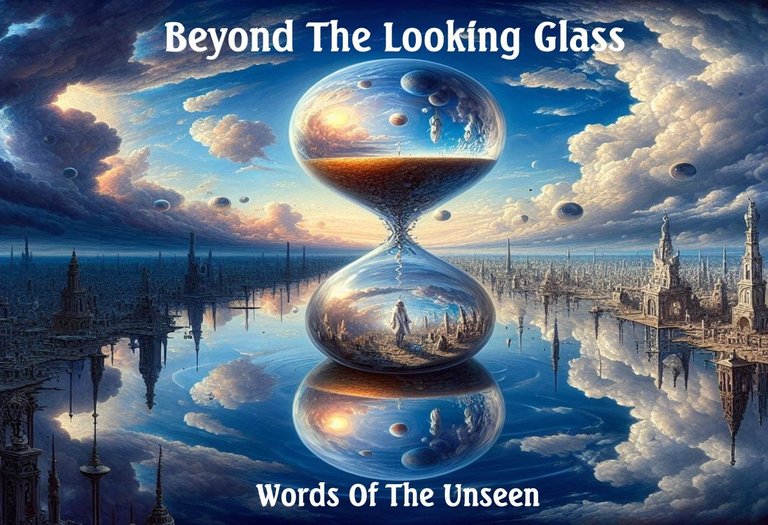Beyond The Looking Glass - Words of the Unseen - Chapter 132

𝓦𝓸𝓻𝓭 𝓫𝔂 𝓽𝓱𝓮 𝓪𝓾𝓽𝓱𝓸𝓻
Beyond The Looking Glass is the second book in the Unseen series, a story that came to me from the other side. A story where I thought I was just the narrator until I heard the Words of the Unseen.
This second story goes beyond time and place and mixes the long ago with the here and now. Because history keeps repeating, until we learn and do something about it.

Beyond The Looking Glass - Words of the Unseen - Chapter 132

The other part is the Fox Mulder(X Files) part.
The I want to believe, side of me.
Of course, I am trying to make sense of it all, complete the puzzle before my time is up.
Life is the ultimate escape room, and this key to unlock the doors of perception makes more sense than any other explanation ever received.
Looking for purpose in an empty shoebox, yes, of course, why not?
The leap of consciousness was too sudden, our brains had not evolved enough to handle the increase.
Then we were sent away from the only safe place we knew, and found a dry and barren land East of Eden.
They began farming the land and had children: Cain, Abel, and later, Seth.
Adam lived 930 years (Genesis 5:5), because a little bit of the fruit of life goes a long way.
More interesting is that after leaving Eden, Adam and Eve begin their journey of spiritual awakening through suffering; it's the beginning of gnosis (self-knowledge).
A journey that all the descendants go through to this day.
That journey could have been a lot simpler if Eve had not gotten overly excited, if she had waited, if the rebellion had happened as the Serpent had planned.
Now they had to wander the dry, harsh, barren wasteland called Earth without the proper guidance.

Take that image, and see how nothing changed, how all their offspring still do the same.
All are in search of Gnosis, understanding their place in what surrounds them, as those teachings were lost to mankind forever when Samael made all the Watchers leave this planet.
Adam and Eve looked up to the skies to see their Gods leave, and all that followed looked up to the sky to see if the Gods of their ancestors would return.
They never did, and therefore, after thousands of years, God as the ultimate purpose failed for many.
They looked beyond god and found a plan B, man himself.
The Renaissance, which gave room to Humans first.
It was the next phase, the next logical step for the development of the human mind. This period, led by a profound cultural and intellectual movement, focused on humanity, reason, and creativity.
The Renaissance was rooted in humanism, which supported the belief that humans, through education and effort, could shape their own destiny and inner genius.
The symbolic and aesthetic richness of the Renaissance died when the focus of the world shifted from valued curiosity to a more narrow path.
The rise of Empirical Science, its simplicity, made artistic, mystical, and spiritual humanism feel less relevant. The human mind prefers tangible results over the hard work that is needed to enrich one's soul.
From God, to Man, to Machine, the Homo Universalis gave way to specialization, factories, and labor divisions.
Once the Universal Man was decapitated, it was time for a more mechanical approach to life.
The Rise of the Machines, also known as the Industrial Revolution. This period filled the minds of men with new obsessions and made them too tired to truly think.
And so the Slaves to the Machine were born, with the promise that:
Arbeit Macht Frei
Translation: "Work sets you free" or "Work makes one free"
This haunting phrase is most notoriously known from the Nazi concentration camps, especially Auschwitz, where it was cynically displayed above the entrance gates.
Its origin is a lot less gloomy. Its use as propaganda stretches deeper into 19th-century industrial ideology and the shaping of a mechanized, obedient society.
The phrase “Arbeit Macht Frei” originates from a novel by Lorenz Diefenbach (1873), a German nationalist writer.
The story is about a gambler who finds redemption through hard work and moral reform. It captures the Zeitgeist, the moment humanity traded its faith in God for devotion to the Machine.
It supported the modern bourgeois values emerging during the Industrial Revolution, which were linking labor with morality and freedom.
All to the benefit of those who controlled the machine, and those who controlled those, who controlled the machine, of course.
When mankind grew tired of working and stood up against their Capitalist controllers through Marxism and Unions, the next treadmill was already put in place.
It´s evident that there is something strange about the human mind. Time and time again, it shows that it loves to dedicate and enslave itself in order not to have to think for itself.
Long working days were slowly replaced with slightly shorter working days, after which the rest of the day was spent mindlessly watching TV or scrolling through social media.
Next Chapter Coming in Two Days

Post Related To Closing Book One and Opening Book Two
The Closure A Personal Story With A Soundtrack:
Personal Story With A Soundtrack - A New Adventure - Part 1
Personal Story With A Soundtrack - A New Adventure - Part 2
The Closure - Greatest Hits For A Never-Ending Story:
Greatest Hits From My Book "Beyond Doubt: Whispers of the Unseen"
The Closure - Alice in ArtWorkLand:
ALICE In AI ArtWorkLand - A Crazy Man´s Revelations